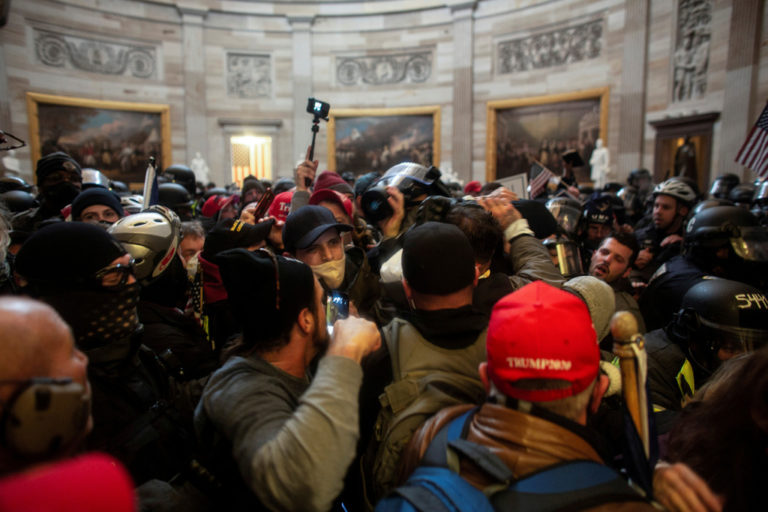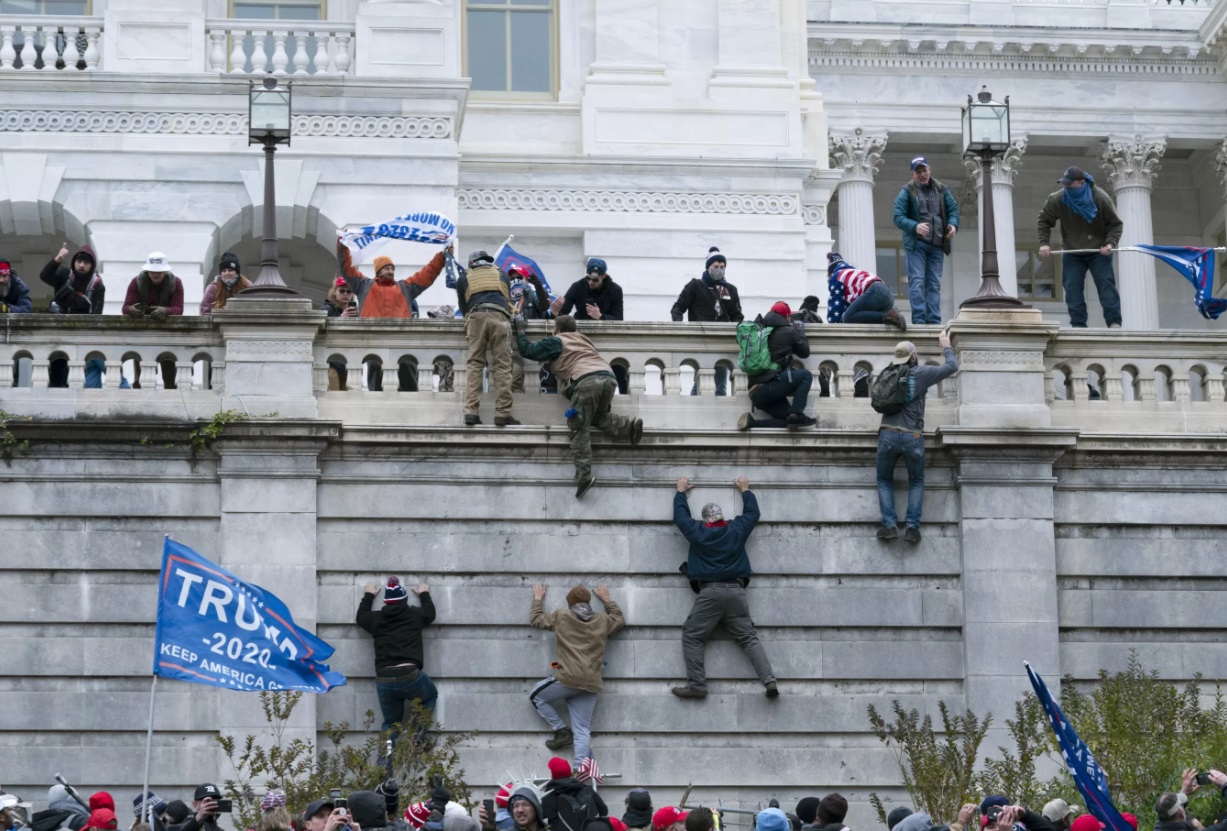The Rise of Republican Fascism and the Ethics of Resistance: A Review of Barack Obama, A Promised Land (New York: Random House, 2020) and Carlos Lozada, What Were We Thinking, a Brief Intellectual History of the Trump Era (New York: Simon & Schuster, 2020)
In the first months of the Trump presidency, I wrote two columns for Impakter Magazine: “Trump Tyranny and the Politics of Resistance” and “Trump and the Problem of Evil.” The evil of the new regime, I postulated, derived from corporate greed underlying the Republican Party and its Libertarian adherents. In these last weeks of his presidency, however, corporations reeled in horror along with the rest of the nation as anarchistic Libertarians joined forces with white supremacist fascists to vandalize the Capitol of the United States, intent on stopping Senate certification of Biden’s election.
The militant thugs who stormed our government, so reminiscent of Hitler’s Brown Shirts, were urged on by President Trump in a final confirmation of his nativistic and authoritarian tendencies.

There would have been no insurrection, however, without the solid Republican Party support of their unstable and disorganized leader. Whatever clinical pathology he suffers from is less determinative of his fascism than Republican loyalty. As Paul Krugman chillingly puts it, there is nothing left of the Republican Party but blind loyalty and tribal ferocity: with 139 Republican members of the House of Representatives and 8 Senators still promulgating the lie that Biden lost the election when they reconvened after the riot, it is clear that Republican Party has “gone feral.”
Barack Obama On the Rise of Republican Obstructionism
In the midst of this turmoil, I have been trying to calm my soul by reading Barack Obama’s autobiography, A Promised Land.
As you can imagine, it comes from another country altogether – one where a hard-working president assembles an experienced set of advisors and cabinet members to reach painstaking, thoroughly thought-through decisions. Given President Obama’s love for rooting about in the weeds of policy-making, I feared the book might prove excessively wonky, but he presents his personal experiences and reflections in his usual engagingly thoughtful style to make his autobiography a particularly interesting read in these difficult times.
Although the most “audaciously hopeful” of Presidents, Obama has been a lifelong adherent to theologian Reinhold Niebuhr’s insistence that we keep ourselves alert to the evils that stalk our world. Obama picks up on what Trump and the Tea Party Republicans are up to from the start. “One thing was certain,” he reflects on their “birther” attempts to declare his presidency illegitimate with the lie that he wasn’t born in America: “a pretty big chunk of the American people, including some of the very folks I was trying to help, didn’t trust a word I said.” Nor does Obama mince words about the racism underlying Trump’s birther lie: “for millions of Americans spooked by a Black Man in the White House, he promised an elixir for their racial anxiety.” Moreover, “Promoting this story, a story that fed not trust but resentment – had come to define the modern Republican Party.”
President Obama’s Promised Land is governed by a sense of responsibility for all of its members in quest of a common good; this requires a “modern social contract” to meet such basic universal human needs as Social Security and Medicare: “We generally understood the advantages of a society that at least tried to offer a fair shake to everyone and build a floor beneath which nobody could sink.”
Adherence to this idea depends upon a trust in government that Obama finds “difficult to sustain” in the face of the extreme economic inequity of American society. He is aware of how the Republican Party cultivates a useful demographic of working-class whites filled with resentment and xenophobia. He worries about right-wing use of the media, with Republican radio and tv shows, news outlets and leaders fostering the win/lose paradigm that white males without a college degree are being unfairly deprived by a “socialist, and “un-American” Democratic Party that ignores their needs and is “far more concerned with the well-being of Blacks and Immigrants than with theirs.”
President Obama’s predictions are chilling:
“ …I found myself asking whether those impulses – of violence, greed, corruption, nationalism, racism and religious intolerance, the all-too-human desire to beat back our own uncertainty and sense of insignificance by subordinating others – were too strong for any democracy to permanently contain.”
What Were We Thinking?
Assaulted for four long years by Trump’s attacks on every norm of civility and democratic process I cherish, not to mention the rule of law itself, I have not been a fan of books about the Trump administration. Intrigued by Carlos Lozada’s promise of “a reading of all the books of the Trump Presidency,” I couldn’t resist picking up his Pulitzer Prize-winning What Were We Thinking? A Brief Intellectual History of the Trump Era.
With many other progressives, I have been resisting like mad ever since Trump’s inauguration. Oddly, what I took away from Lozada’s compendium was not more horror at what we have been through but a critique of the way we have resisted.
I found myself listing my own takeaways from Lozada’s takeaways: Here are the questions I asked myself upon reading his conclusions (reproduced below), and some of my (very tentative) reactions and proposals for progressives (my personal analyses are in italics):
Demonization is Undemocratic:
“Aside from generalities about how Trump supporters may have voted for him out of a ‘depth of alienation,’ there is little effort in these (resistance) pages to understand, let alone reach out to, communities beyond the ones the (white liberals) themselves represent.”
“The resistance after Trump’s election worries endlessly about Trump’s America but betrays contempt for Trump’s Americans.”
It is the contempt of the elite, college-educated, mainly urban people for these others that has driven them, and keeps driving them, to believe Trump’s lies. My solution: aim Biden/Democratic legislation directly at them, attending to their needs like jobs, stimulus money, health care, small business loans immediately; and be sure to let them know where these benefits come from.
There is “no room (in resistance ideology) for traditional conservatives or political moderates who may also want to stand up for their values in Trump’s America but find the president or his policies no less appalling…”
We have common needs and values: find out what these are, then work for bipartisan solutions. Develop more tolerance for compromise.
“Simply because Trump’s moral compass is broken does not mean that yours unerringly points north. There is a difference between being righteous and being right.”
One of the things Trump voters hate about us is our conviction that we are smart and right and they are dim-witted and immoral. Honor our common humanity by showing them respect; follow Michelle Obama’s rule that “when they go low, we go high.
Liberal Progressives: We Need to Change the Way We Think
“I don’t think the urgency of our situation means that we cannot afford uncertainty. I need to believe in the value of the doubt I now feel, in its ability to create a new space for the slowness of thought and conviction.”
Do not let the (ideological) perfect be the enemy of the (common) good. Listen, don’t proclaim. Keep question marks in your conversations and replace intellectual arrogance with a tone of uncertainty or, at least, open-endedness. This leads the door open for true interchange.
We take the shape of the institutions we are in. “Popular culture compels us to ask ‘What do I want?’ Institutions urge a different query: ‘Given my role here, how should I act?’ … It is a question that combines personal responsibility with higher obligations, invoking conservative traditions that sycophants ignore, Never Trumpers forget, and pro-Trump intellectuals rationalize away…”
Institutions structure our thoughts and actions and embody our ideas; they form us. “The problem of institutions today is that rather than being formative, they have become performative, functioning as platforms for individual advancement rather than molds for individual improvement.”
Reconsider the institutions (democratic elections, rule of law, division of power) we liberal progressives cherish and work to keep these whole rather than going all revolutionary, making speeches about overthrowing everything. Revolution is too close to Libertarianism anarchism to foster the common good.
Our Uneasy Future: We Are Not Evolving into Better People
“It’s a soothing vision – that today’s misdeeds will be overtaken by time, demography, and the eventual recognition of lasting traditions. . . the arc of the moral universe may bend toward Justice, or it may snap back in our faces” in the form of a xenophobic backlash.
“The mantra of inclusion is always being undermined by the mistrust and hatred of foreigners.”
With many other progressives, I have assumed that as whites become a minority demographic in America – and this is coming soon, probably by 2040 – non-white voters will see to it that equity is established. But the perennial and inherent xenophobia, along with the propensities for tyranny, brutality, suppression of opponents and outright cruelty that the Trump years demonstrated, are not going away with him.
Conclusion: Our Job in the Face of Continuing Toxicity
The fear and the greed and the violence to human dignity that we have witnessed in the last four years have always been with us in America, in the persistence of economic inequality and in our brutal history of enslavement and genocide. Many American whites, including progressives, still act under white supremacy’s assumption that white culture is American culture.
The miracle of constitutional democracy is that it has enabled us to broaden our founders’ narrow concept of citizenship to include men and women of every race and ethnicity and gender identity. It was their firm grasp of the human evil that will always seek to undermine the common good that led them to embrace a balance of power and rule of law they established in our Constitution sufficiently flexible to keep us and protect us from the powers of tyranny.
The riot at the United States Capitol reminds us how fragile democratic institutions are and how much attention we must devote to preserve them. Biden won and we took back the senate because legions of us, from oldsters phoning and texting to Georgia teenagers pounding the pavements, put our sweat into it. Our victory was not achieved by mere intellectual adherence to our ideas but by hours and hours of phone calls and texts and plain old door knocking, not to mention endlessly tedious meetings and committee deliberations.
Life, as Aristotle puts it, does not consist in ideas but in actions. Keeping ourselves alert to social evil and our eyes on the prize – that promised land of the common good – the only way forward for us is the nitty-gritty slog of engaged democracy.
EDITOR’S NOTE: THE OPINIONS EXPRESSED HERE BY IMPAKTER.COM COLUMNISTS ARE THEIR OWN, NOT THOSE OF IMPAKTER.COM.
FEATURED PHOTO: Mob scaling the west wall of the U.S. Capitol on Wednesday, Jan. 6, 2021, in Washington, D.C. (AP Photo/Jose Luis Magana)









